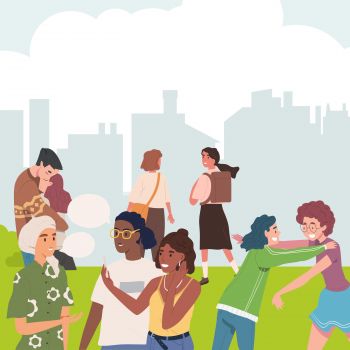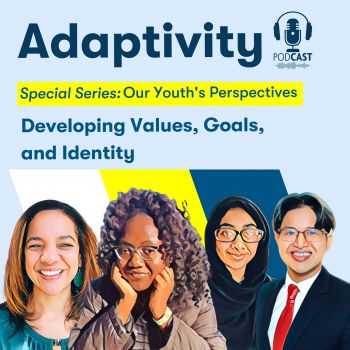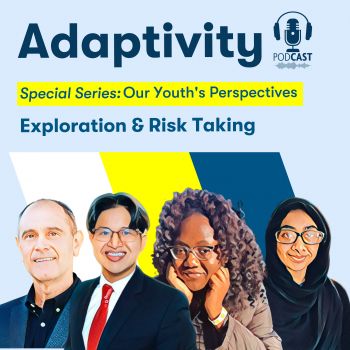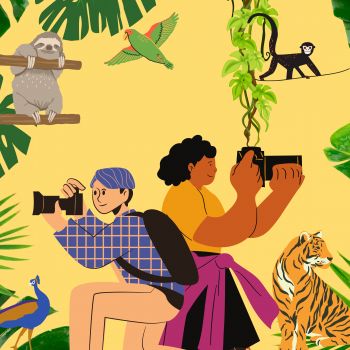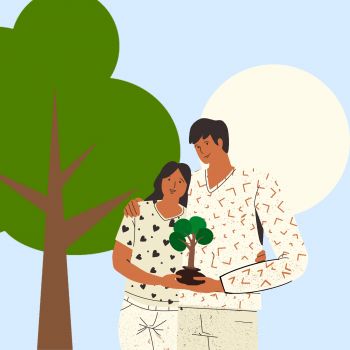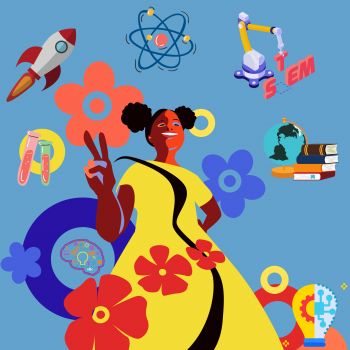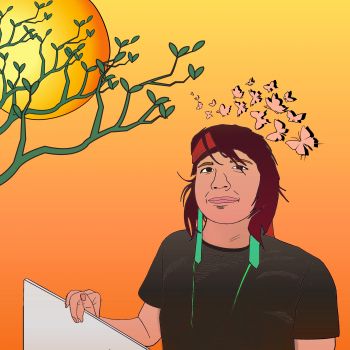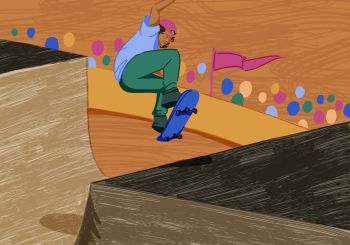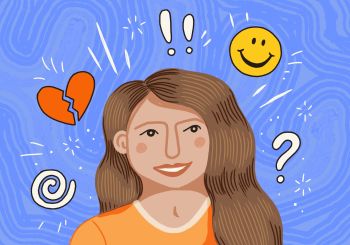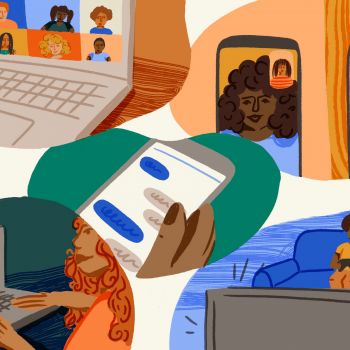Ron Dahl It can be tough, sometimes, for teenagers to be honest about their emotions, especially if the adults around them have certain expectations.
Mahisa Mannan I had to make sure that I look presentable and always happy around others, even if I was feeling really awful that day.
Ron Dahl It may seem easier to withdraw and NOT share one’s feelings.
Mahisa Mannan For the longest time, I believed that talking out my feelings to someone I trusted was the wrong thing to do.
Ron Dahl But developing healthy coping skills to handle feelings like anxiety, anger or sadness is vital for our mental health.
I’m Ron Dahl, founding director of the Center for the Developing Adolescent, and this is Adaptivity, where we explore the science of adolescence, untangling misconceptions about the years between childhood and adulthood.
We explore new insights into the rapid cognitive, emotional, and social changes that are happening during these years. And how the developing adolescent brain is primed to promote healthy and adaptive learning.
This is the first episode of a three-part series called ‘Our Youth’s Perspective,’ brought to you by members of the Center’s Youth National Scientific Council on Adolescence.
*****
Mahisa Mannan Hi everyone. My name is Mahisa Mannan, I’m 22 years old, and I’m your guide on this episode about decision making and the importance of emotional regulation–that’s how each person handles their emotions in a positive way. We’ll get right back to that in a moment, but first, with me are my co-hosts, who are also on the Youth National Scientific Council on Adolescence, otherwise known as the YNSCA, Michael And Tomi…
Michael Nguyen Hi everyone, I’m Michael.
Tomi Dugbo And I’m Tomi!
Mahisa Mannan Now to start things off, I do want to mention that in terms of what exactly I mean by the importance of decision-making and emotional regulation, I’m not saying that we as youth should just do whatever society deems best for us.
So, I kind of want to talk about my own experience. Personally, I’ve always been someone who had to deal with my emotions quietly. See, I’m a Muslim American woman. When I was younger, I was so incredibly shy that I didn’t even speak until I was 4 years old. When I finally did talk though, I always had to really be careful about how I spoke with others; I had to be really careful about my reputation within the Bengali community. I had to make sure that I looked presentable and always happy around others, even if I was feeling really awful that day. These were the types of things that I was pretty much taught all my life. It sort of became my norm. While I do believe that there should be a time and place for handling negative emotions, this way of thinking has caused me to develop unhealthy habits regarding my own mental health.
What I mean by that is, because I became so worried about how others viewed me, I chose to isolate myself in my room without eating anything for like so many hours a day, whenever I was feeling sad or upset. For the longest time, I believed that talking out my feelings to someone I trusted was the wrong thing to do. Because I didn’t want to feel like a burden to them, and I didn’t want to make them worry about me. because I would have to worry about how they would feel instead.
I still feel like I can’t fully express myself or mention how I feel around my own family because I don’t want them to feel upset for me, you know?
I think because of this way of thinking, it also caused me to develop such intense anxiety that even now I find it hard to make decisions for myself because I’m so afraid of being seen as a failure. I simply allowed others to make my decisions for me, just so in my eyes it wouldn’t be seen as my fault if things went wrong.
Of course, this led to people being mad at me for not being able to make my own decisions and then it would just turn into this same vicious cycle over and over again of me not wanting to make my own decisions because I was afraid of what would happen in the end.
So, I was wondering, Michael and Tomi, have you two ever felt like this before, with, like, your own experiences in your childhood?
Tomi Dugbo Yeah definitely, like I can completely relate to all the things that you were talking about, like growing up. Especially from, like, an immigrant family. I feel like it’s a lot of similar experiences of having insecurities and, like, being compared to family members and things like that.
Mahisa Mannan I’m so glad you feel the same way, honestly. How about you, Michael?
Michael Nguyen So, I actually completely understand where you’re coming from. And it’s really wild how we’re all basically living different versions of the same experiences. Because my perspective within the Vietnamese community is almost the same. You know, expressing emotions isn’t really our forte. So, growing up, most of my social interactions were extremely formal. And my actions mostly just stemmed from a form of filial piety. And it became really bad when I transferred high school my freshman year where all I wanted to do was fit in. So most of my decisions and the way I felt were just a reflection of those around me.
Mahisa Mannan It really is like a different version, isn’t it?! I feel like all of us are probably from an immigrant family, too, where our parents probably came from another country or something. So I feel like that also plays, like, a big role, since my parents were pretty strict, so that’s just another level, right, of how that affected me. Thank you guys for sharing that with me, actually.
Tomi Dugbo Yeah, no problem. It’s always nice talking to you guys about these topics and seeing the ways that we relate to each other.
Mahisa Mannan Yeah, definitely. For myself, I always found it really hard for me to talk about it, because I still deal with that, like even nowadays, I still have that happen. If I feel really sad or upset, I still lock myself in my room and don’t come out for hours, and like, or sometimes even days. Which is a really bad habit to have!
But as of right now, it’s something I really want to break out of, since I do have a support system that I hold very dear to me. And because of how I was when I was younger, and how people have reacted to me back then, I still feel like I can’t talk to them about it. It’s like a lingering feeling, you know? And I’m still trying to break out of it.
My question now is like, what ways do you guys get out your emotions? Like, do you journal, do you talk to someone about it, all that jazz?
Michael Nguyen For me to deal with my emotions and work out my thoughts, it’s just nice having someone there to listen to me. And a lot of times, they don’t even have to be saying anything back. It’s just the fact that them as a presence is there, and that they are acknowledging me, and recognizing my feelings, I think it’s really important.
And for me, it helps me be able to work out my thoughts as I’m speaking about them out loud and having someone receive them and give me feedback. It allows me to understand, I guess, these emotions that I’m feeling inside and sometimes it’s really bad that we just keep them inside, and by having an outlet to, you know, express them is one of my favorite ways to deal with my emotions.
Mahisa Mannan Yeah, I definitely agree with that, honestly. What about you, Tomi? Is there a certain way that you get out your emotions?
Tomi Dugbo Yeah, like with what Michael was saying, it is good to talk about it. But for me personally, I first try and think about it first, have some time to myself to truly think about what’s going on and like the way that I want to handle it. And then when I feel like I’m comfortable enough to talk to someone else, I will talk to someone else about it. I’m not the type to just hold it in. But, I do need like a moment to myself first, before I go and talk to someone, or like vent, basically.
Mahisa Mannan My other question that I have is: How was decision-making for you guys when you were teenagers? Did you take a lot of chances? Did you choose to stay in your own bubble a lot of the times?
Tomi Dugbo I would say for me, that is was different compared to like middle school and high school. Cause like in elementary school and middle school and things like that, it was more like I didn’t really make my own decisions. It was like I just went with the flow with everything and just followed along with all plans, whether it was my parents or friends made, and things like that.
And also I think it had to do with my parents were more strict when I was younger. So, when I entered high school, I don’t know what changed. It’s just that I started to make more plans and be more adventurous and try new things.
And, it’s like a little joke in my family with my parents: like I’m going to, at the end of the day, if I really want to do something, I’m gonna do it, whether or not I have the approval of others, because if I feel in my heart that that’s what I am destined to do, or that’s something I should do, then I’m going to do it. Of course it’s not like negative or bad things, but just like things like that. So, I’ve definitely gotten better with decision making and making my own decisions in certain aspects of my life.
Mahisa Mannan What about you, Michael?
Michael Nguyen I think for me, well I was a really, really shy kid growing up, really introverted. You know, just the way of my personal life at home, always having to defer to adults and everyone else around me, with me being the youngest, that was everyone around me. A lot of my decisions were again, just whatever the group wanted, I guess. Even when it was amongst peers, or whenever we were doing a group project, I would let them pick and go whatever they wanted a lot of times, just because I wanted to avoid a confrontation, even if it was just a little piece of dialog, back and forth, that would come with a difference of opinions.
Since then, I’ve been able to, you know, really find my own voice and personality and have that courage to step out beyond what is comfortable with me and take those chances and you know not just be in my bubble all the time.
Mahisa Mannan Thank you for sharing, guys. So, that was our experience in terms of emotional regulation and decision making.
So now, we’re going to discuss with Adriana Galván about the science behind decision making and emotional regulation in greater detail.
*****
Mahisa Mannan Adriana Galván is a Professor of Psychology at UCLA and co-director of the Center for the Developing Adolescent.
So, I believe part of your research is the neurobiological changes in adolescence. So what made you choose that area of research?
Adriana Galván There wasn’t a lot of research on how the brain supports these very normative changes that occur during adolescence. And one thing that’s come out of this research, not just mine but researchers around the world who study the neurobiological bases of adolescent behavior, is that it helped establish that adolescence isn’t just an extension of childhood in a sense that everybody’s the same, they just may look a little different. It actually helped establish that there’s a distinct biological process that’s helping adolescents become who they are.
Mahisa Mannan So, regarding the neurobiological changes, what would you say causes the greatest impact on both an adolescent’s decision-making skills and their emotional health, and why would you think so?
Adriana Galván How we make decisions is based on so many different factors. It’s based on the immediate rewards of making a particular decision. For example: should I have a piece of cake now or have a carrot? You know, like you you value those things based on how immediate the reward is going to be, whether you’re considering the longer-term outcomes of that decision, your internal state, so how do I get, maybe I’m really hungry so I’m going to have a more filling piece of cake or something like that. So, many different things impact how we make decisions.
One research finding that’s been found many times is that adolescents in particular are influenced by the decisions people around them are making. Sometimes those people are their friends or their peers, sometimes those decisions are adults in their lives, and so the social influence of decision-making is particularly strong during adolescence. And I think that’s actually a strength of adolescence.
Sometimes you know the media tries to say, ‘well adolescents are so susceptible to peers that that’s a bad thing,’ but that’s actually how adolescents are so good at being activists or why they’re really good at mobilizing their friends and other people for causes, because they are responsive and listening to the social influence around them.
Mahisa Mannan How does it also affect our emotional health? Is there a certain neurobiological change that affects us teens emotionally, like what has the biggest impact on us?
Adriana Galván Yeah, so in addition to brain regions that are undergoing change regarding the reward system, there is also a lot of change in brain systems that help us process emotions: positive, negative, neutral, whatever the emotion is. And research has shown that during adolescence, there is heightened responsivity to emotions. Again positive, negative, neutral. In part, because emotions are really helpful for learning about the environment. So how something makes you feel is informative. And adolescents, or really the adolescent brain, is attuned to responding to that emotion.
Mahisa Mannan So, we have to make a ton more decisions than we did when we were younger, right, so what about decision-making is so essential, and how do we as adolescents ensure that we’re making the right decisions for ourselves?
Adriana Galván Yeah. I mean sometimes that’s part of, of all of us growing up and learning from experience and learning from our environment is that sometimes in the moment we don’t know what the best decision is. And that can actually be a little bit distressing for people not just adolescents, but older adults, too, that you know you’re, you’re given a set of options and your brain is trying to process all of them and trying to determine which one is right for you and nothing is ever clear cut and, and this is part of the reason that the brain changes during adolescence as you’re tasked with making more decisions for yourself and for your future, or for your family.
There’s a hypothesis, this theory that it’s the reason that the adolescent brain may be more comfortable with uncertainty. There’s some research showing that if you give adolescents an option, and you don’t know what’s going to happen, that their brain is more accustomed to, or, or more comfortable with that uncertain outcome than adults are because adults want certainty.
Mahisa Mannan So, how does one keep themselves from regretting their past decisions and like sabotaging any present choices that they end up encountering?
Adriana Galván It’s a really good question, it really is, because I think sometimes our inclination is to say you know what if only I hadn’t done that I would be in a different place or something like that. But, remembering and reframing that kind of regret or self-doubt and reframing it as a learning opportunity–”that was a learning opportunity, now I know something else I didn’t know about myself.” Having that in the back of your brain as a learning outcome I think is, is one way to not be too hard on yourself.
Mahisa Mannan Yeah, I have a hard time doing that, so I agree with you! So, in terms of an adolescent’s emotional health, how much do you believe that adolescents should have to keep their emotions in check for the sake of others? Like, to what extent do you think that one should be closed off about their emotions without it becoming too harmful?
Adriana Galván I think that adolescents shouldn’t hide their emotions, or people right, should feel comfortable, we should be in an environment where it’s okay to share what you’re feeling. And emotions are tools for us to convey what we’re feeling and what we need, and it’s very healthy to do that.
Mahisa Mannan Would it make sense for sometimes to hold off on expressing their emotions in, like, a private place, or should they always say how they feel up front?
Adriana Galván I can imagine that if expressing yourself in a way that would cause you further harm, maybe that’s not a good idea, right? Finding a different way, a different space or a different person or a different outlet for that expression would probably be most beneficial. That’s the case in which emotion regulation, you know the term scientists use, emotion regulation, would be when it’s going to cause you harm. But that doesn’t mean that the emotion shouldn’t be expressed, or the feeling shouldn’t be expressed in some other context.
Mahisa Mannan I also was wondering: for the adolescents who maybe have trouble expressing their emotions, or who maybe have a hard time making decisions for themselves, is there any advice you’d like to give to them?
Adriana Galván I think there are different ways of expressing your emotions. Sometimes we’re told by our society that the best way to express your emotions is to talk your emotions out to someone else. And I found that journaling is very helpful, was very helpful for me as an adolescent. And now as an adult I love reading those journals because it helps me appreciate how I learned from who I was and how I’m still that same person! I still prefer to journal and write out a feeling. If I want to share something with someone I’d probably feel better writing it out rather than saying it. Using different strategies to express an emotion that isn’t the norm,
Mahisa Mannan Well, thank you for having this conversation with me. I really appreciate it, and I’ve learned a lot of things from you. Thank you so much!
Adriana Galván Good! I really appreciate it.
*****
Mahisa Mannan That was Adriana Galván, professor of psychology at UCLA and Co-director of the Center for the Developing Adolescent.
Thank you, everyone, so much for listening to our podcast today!
Michael Nguyen Hi, this is Michael again. Next in our three-part series, ‘Our Youth’s Perspective,’ you’ll hear from me on the importance of exploration and risk taking!
*****
Ron Dahl I’m Ron Dahl, and this has been a special episode of Adaptivity from the Center for the Developing Adolescent.
We’d like to thank Mahisa Mannan from the Center’s Youth National Scientific Council on Adolescence for sharing her experience with us. Thanks also to fellow council members Michael Nguyen and Tomi Dugbo.
For more on the developmental science of adolescence and the YNSCA, check out our Instagram, @develadolescent.
If you’d like to learn more about the science of adolescence, visit us at adaptivitypodcast.org or share your thoughts through the contact information at our website.
Our podcast is produced at UC Berkeley for the Center for the Developing Adolescent. Our senior producer is Polly Stryker, our producer is Meghan Lynch Forder, and our engineer is Rob Speight. A special thanks to Ahna Suleiman and Xochitl Arlene Smola for their facilitation of the YNSCA projects.

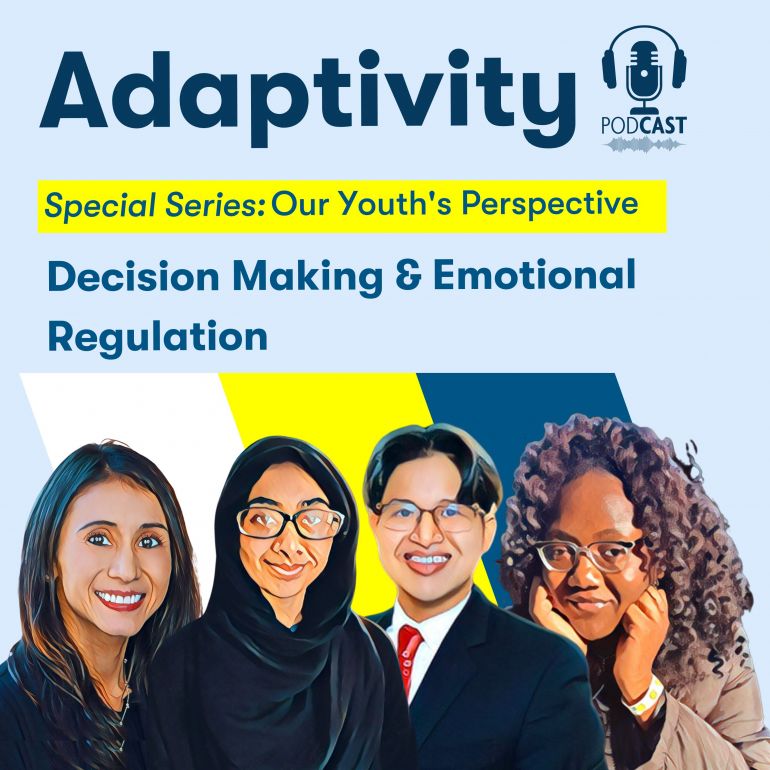
_350_350_80_c1.jpg)
_350_350_80_c1.jpg)
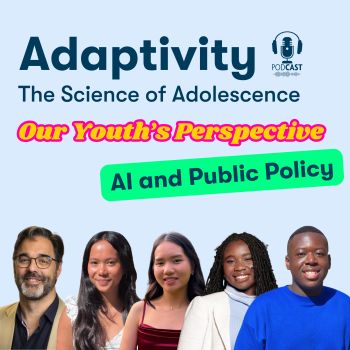
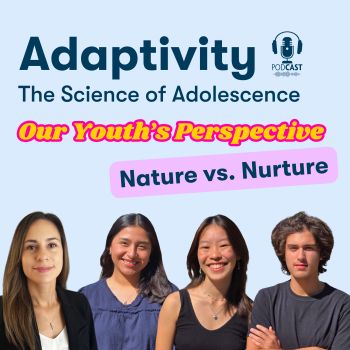
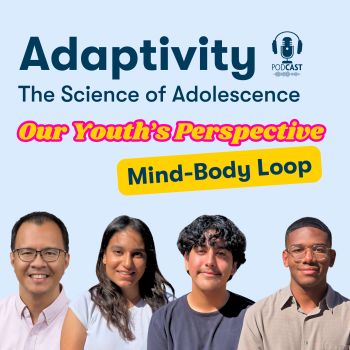
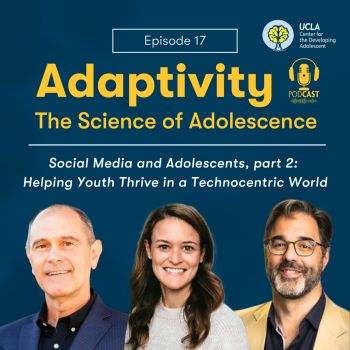
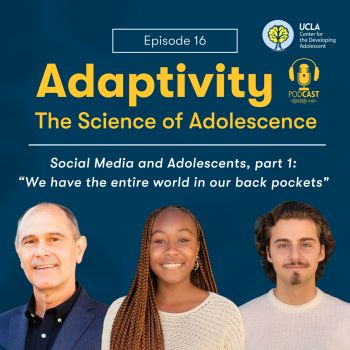
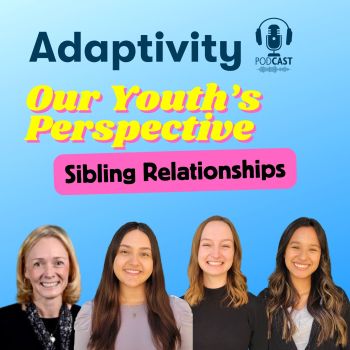
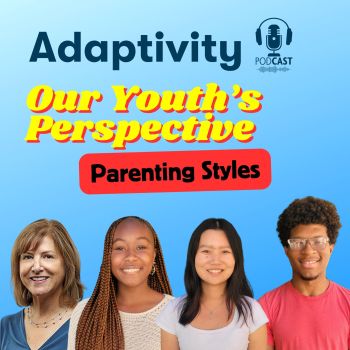
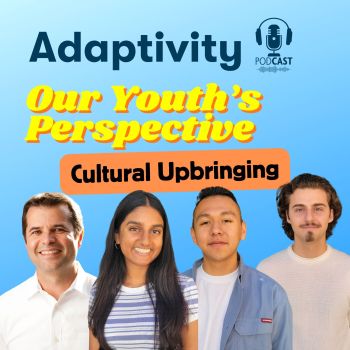
_350_350_80_c1.jpg)
